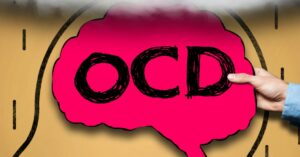It’s no secret that OCD can be a debilitating disorder. But what many people don’t know is that it can often be caused by trauma. In this blog post, we will discuss the link between OCD and trauma, and things you should know if you are affected by this connection. If you are struggling with OCD, please don’t hesitate to reach out for help! There is hope and support available for you.
Contents
Understanding OCD And Trauma
 Obsessive-Compulsive Disorder (OCD) is an anxiety disorder characterized by recurrent and intrusive thoughts, compulsions, and obsessions. Trauma, on the other hand, involves exposure to a distressing or frightening event that leads to a feeling of helplessness and intense fear.
Obsessive-Compulsive Disorder (OCD) is an anxiety disorder characterized by recurrent and intrusive thoughts, compulsions, and obsessions. Trauma, on the other hand, involves exposure to a distressing or frightening event that leads to a feeling of helplessness and intense fear.
While both conditions can be debilitating, it is important to understand the differences between them. Though OCD is often associated with trauma, it is important to note that there is no scientific evidence to support the notion that these two are causally linked.
Both conditions are usually treated with a combination of psychotherapy and medication. It is necessary to understand both conditions thoroughly in order to identify effective treatment strategies.
Is OCD Caused By Trauma?
This is a difficult question to answer as there is no definitive link between the two. While traumatic experiences may be associated with OCD, it does not necessarily mean that trauma causes OCD. There are various theories on how trauma may contribute to the development of OCD.
- One theory suggests that individuals who experience extreme or prolonged stress can become more vulnerable to developing compulsions and obsessions. This vulnerability is thought to be based on a biochemical imbalance that occurs in response to traumatic experiences.
- Another theory suggests that trauma may cause individuals to become hyper-vigilant, leading them to develop irrational fears and false beliefs. These fears then manifest themselves as obsessive thoughts or compulsive behaviors.
It’s important to note that there is no single cause for OCD and that other factors may also be involved. For example, genetics, early exposure to unhealthy behaviors, and certain environmental triggers can all contribute to the development of OCD.
Link
However, there is a possible link between trauma and OCD. Individuals who have experienced traumatic events may be more likely to develop compulsive behaviors over time as they try to cope with their anxieties, fears, and traumatic memories.
It’s also important to remember that not everyone who experiences a traumatic event will develop OCD. Conversely, not everyone who has OCD has experienced a traumatic event. Therefore, it is important to explore other possible causes of OCD when assessing a patient’s condition.
If you or someone you know has experienced trauma and is struggling with OCD, it’s essential to seek professional help from a mental health provider. A qualified therapist can assess your symptoms and develop an individualized treatment plan specific to your condition.
How Does Trauma Affect OCD?
 When a person experiences a traumatic event, the brain reacts by feeling overwhelmed and unable to cope with the situation. This overwhelm can manifest in many different ways, one of which is obsessive-compulsive disorder (OCD).
When a person experiences a traumatic event, the brain reacts by feeling overwhelmed and unable to cope with the situation. This overwhelm can manifest in many different ways, one of which is obsessive-compulsive disorder (OCD).
People who experience trauma often have difficulty regulating their emotions and thoughts, leading them to engage in repetitive behaviors or rituals in order to try to gain a sense of control over their environment. This can include handwashing, counting, checking, and other repetitive behaviors that are designed to provide comfort or certainty in times of distress.
Studies have shown that trauma is often at the root of OCD and that people who experience traumatic events often develop OCD symptoms as a result. One study found that 44 percent of adult OCD patients reported that their illness was caused or at least triggered by a traumatic event.
However, it is important to remember that not all people with OCD have experienced trauma. In fact, many people with OCD do not report any history of trauma. And there could be other underlying causes for their condition.
What Are The Consequences?
With OCD and trauma, the consequences can be devastating. Some of these include:
- Inability to complete normal tasks: OCD is a condition that can make it difficult to concentrate on important tasks. This, in turn, can lead to decreased productivity and increased stress levels. This can further worsen the symptoms of OCD and trauma.
- Excessive worrying: Trauma can cause people with OCD to worry excessively about their safety, the safety of others, and even their ability to succeed in everyday life. This can lead to feelings of anxiety and depression.
- Avoidance behaviors: People with these conditions may also develop avoidance behaviors such as avoiding certain people or places that make them anxious or uncomfortable. These behaviors can further compound the symptoms of OCD and trauma, making it even harder to cope with.
- Low self-esteem: Both conditions can also lead to low self-esteem due to difficulties in completing tasks, increased anxiety levels, and avoidance behaviors. This can further complicate the symptoms of OCD and trauma, creating an even more difficult situation for those affected by it.
- Physical symptoms: In addition to the psychological effects of these conditions, physical symptoms may also occur. These can include unexplained muscle tension and headaches, fatigue, digestive problems, and difficulty sleeping.
Overall, both can have devastating consequences on an individual’s life if not properly treated. It is important for those affected by these conditions to seek professional help as soon as possible in order to reduce the severity and frequency of symptoms. Doing so can also reduce the risk of further complications down the line.
What Is The Root Cause Of OCD?
 The root cause of obsessive-compulsive disorder (OCD) remains a mystery, but several theories have been proposed. One popular theory suggests that OCD is caused by trauma or stressful events in one’s life. Traumatic experiences can trigger an abnormal response from the brain, leading to recurring thoughts and behaviors associated with OCD.
The root cause of obsessive-compulsive disorder (OCD) remains a mystery, but several theories have been proposed. One popular theory suggests that OCD is caused by trauma or stressful events in one’s life. Traumatic experiences can trigger an abnormal response from the brain, leading to recurring thoughts and behaviors associated with OCD.
However, the link between trauma or stressful events and OCD is still not fully understood. There is evidence that suggests a correlation between the two, but it is unclear whether or not trauma directly causes OCD. Additionally, not all people suffering from OCD have experienced a traumatic event in their life.
Generally, only one root cause is not defined yet, and the development of OCD is likely to involve a combination of factors. These can include both environmental and genetic components, such as:
- Family history
- Biochemical imbalances in the brain
- Certain personality traits
All these factors can contribute to the development of OCD, and understanding them is essential for finding effective treatment solutions.
How Can You Manage It?
In any case, managing the condition is essential if you think that you may have been affected by trauma. It is important to seek professional help and get a diagnosis from an expert. Some of the treatment options to manage OCD include:
- Cognitive-Behavioral Therapy (CBT): CBT is a type of psychotherapy that focuses on helping individuals identify and modify their thought patterns and beliefs. This type of therapy helps to reduce anxiety, increase self-esteem, and improve problem-solving skills.
- Exposure and Response Prevention (ERP): ERP is a type of psychotherapy that focuses on exposing patients to the source of their anxiety, and then teaching them ways to manage their response. This type of therapy helps patients learn how to challenge irrational thoughts and understand the connection between their thoughts, feelings, and behaviors.
- Medications: There are several medications available for people with OCD. These medications can help to reduce symptoms and improve overall functioning.
- Support Groups: Joining a support group for people with OCD can be beneficial in providing emotional support, understanding, and encouragement.
- Lifestyle changes: Finally, making lifestyle changes can also help to manage OCD. Some of these include reducing stress, exercising regularly, getting enough sleep, and eating a balanced diet.
All in all, these are just a few of the things you should know about whether OCD can be caused by trauma. If you think that you may have been affected, it is important to seek professional help and explore treatment options. With the right support and treatment plan, you can manage your symptoms and live a full life.
Remember to always take care of yourself and your mental health. Seek help whenever you need it, and don’t forget to practice self-care. With the right support, you can manage your OCD and live a fulfilling life.
Conclusion
In a nutshell, OCD and trauma might be linked, but it is important to note that more research is needed in order to come up with a definite answer. Additionally, it is equally important to recognize that even if trauma may be a factor in developing OCD, there are still other causes and risk factors associated with this disorder.
Get an accurate diagnosis and take the right steps to recovery. It’s important to talk with a mental health professional who can help you better understand your situation and create a treatment plan specifically tailored to your individual needs.
For more information and guidance, please contact OCDMantra. OCD is a mental health disorder characterized by obsessions and compulsions. If you have any queries regarding OCD treatment, ERP therapy experienced therapists at OCDMantra can help: Book a trial OCD therapy session


